When it comes to gardening, we are always searching for natural and cost-effective ways to care for our plants. One common question that often arises is whether tomato plants benefit from coffee grounds. Coffee grounds have gained popularity as a potential fertilization method due to their nutrient content and ability to slightly acidify the soil. But do tomato plants really like coffee grounds?
Let’s explore the benefits of using coffee grounds for tomato plants and whether they make a noticeable difference in their growth and production.
Key Takeaways:
- Tomato plants thrive in slightly acidic conditions, and coffee grounds can help create the right pH environment.
- Coffee grounds contain essential nutrients like nitrogen, phosphorus, and potassium, which are beneficial for tomato plants.
- Using coffee grounds as a fertilizer may not result in immediate growth effects, but it can contribute to creating a more suitable soil environment for tomato plants.
- When using coffee grounds, it is important to monitor soil acidity, avoid excessive use, and consider other organic fertilizers for optimal tomato plant growth.
- While coffee grounds have some benefits, their effects on tomato plants are not scientifically proven, and moderation is key.
Tomato Plants and Soil Acidity
Tomato plants thrive in slightly acidic soil conditions, making it crucial to maintain the right pH level for optimal growth. Coffee grounds can play a role in achieving the desired acidity, although their impact may not be significant. While coffee grounds are known to be slightly acidic, the level of acidity can vary depending on factors such as the type of coffee used and the brewing process.
When using coffee grounds as a soil amendment for tomato plants, it’s important to monitor and adjust the soil pH accordingly. The acidity provided by coffee grounds can contribute to creating a slightly acidic environment that tomato plants prefer. However, it’s worth noting that the acid content in coffee grounds is not potent enough to drastically alter soil pH. Therefore, it may be necessary to combine coffee grounds with other methods of acidity regulation if a specific pH level is desired.
In conclusion, while coffee grounds can help create a slightly acidic environment for tomato plants, their effect on soil pH is relatively small. It’s important to consider other factors that can influence soil acidity and to monitor and adjust the pH as needed. Balancing the soil’s pH provides an optimal growing environment for tomato plants and ensures they receive the necessary nutrients for healthy growth.
Using Coffee Grounds as Fertilizer
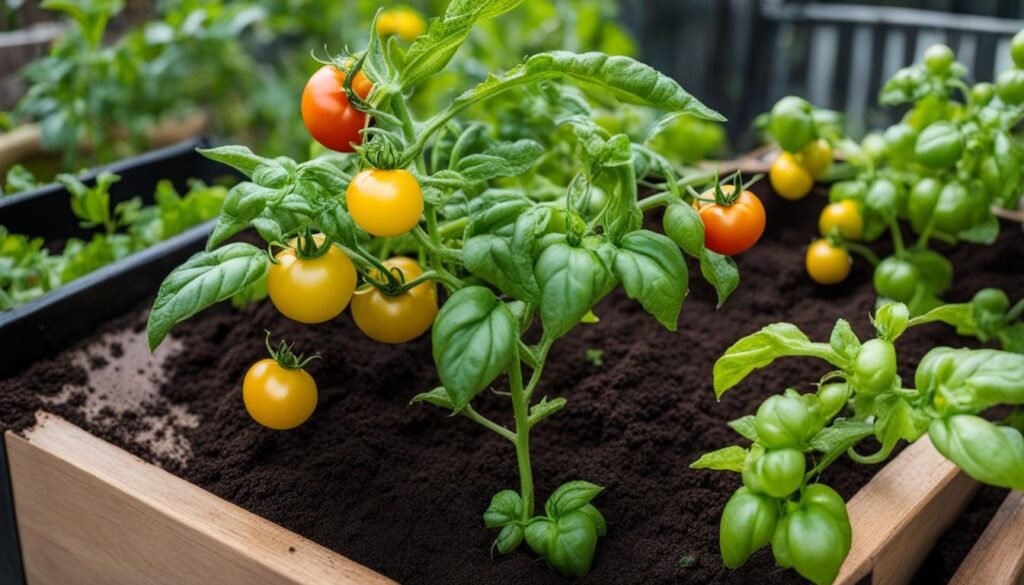
Coffee grounds can be a beneficial fertilizer for tomato plants, providing them with essential nutrients for growth. These grounds contain nitrogen, phosphorus, and potassium, which are vital elements for plant health. When incorporated into the soil, coffee grounds slowly release these nutrients over time, contributing to the overall well-being of tomato plants.
To use coffee grounds as a fertilizer, simply mix about 1 cup of used coffee grounds into the top 2-3 inches of the soil around your tomato plants. This will introduce the nutrients gradually and help create a more suitable soil environment for their growth. However, it is important to note that coffee grounds do not act as traditional fertilizers and may take some time to have a noticeable impact on plant growth.
Another way to utilize coffee grounds is by incorporating them into compost. Coffee grounds can be added to your compost pile or bin, where they will break down over time and contribute to the overall nutrient content of the compost. However, it is recommended to limit the coffee grounds to less than 20% of the compost material to avoid creating an overly acidic compost that could be detrimental to your tomato plants.
Overall, using coffee grounds as a fertilizer can be a natural and cost-effective way to support the growth of tomato plants. However, it is important to use them in moderation and in combination with other organic fertilizers and amendments for optimal results.
Benefits of using coffee grounds as tomato plant fertilizer:
- Provides essential nutrients like nitrogen, phosphorus, and potassium
- Contributes to creating a suitable soil environment for tomato plants
- Can be incorporated into compost for overall soil health
- Natural and cost-effective alternative to traditional fertilizers
Coffee Grounds as Mulch for Tomato Plants
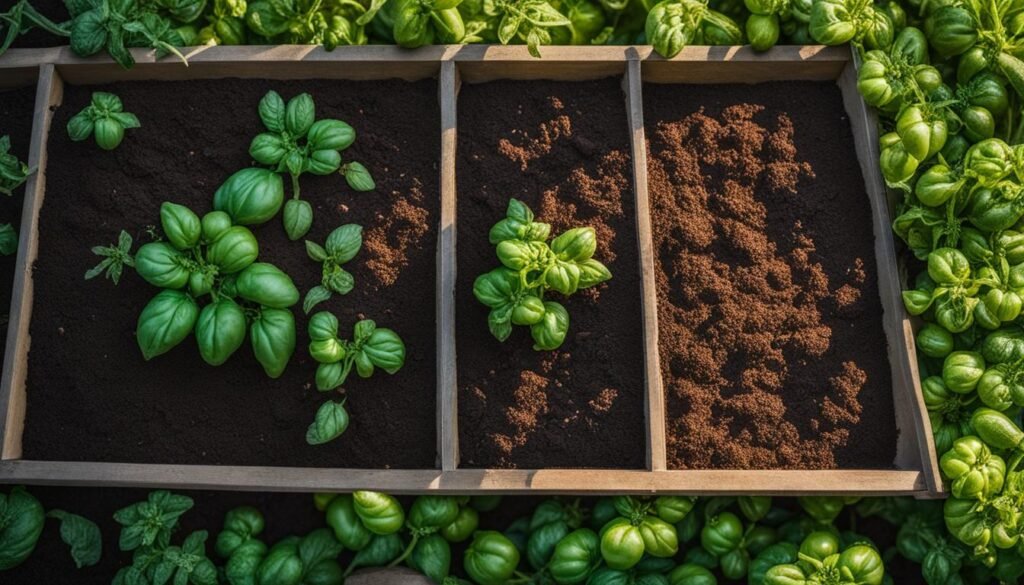
When it comes to growing healthy and productive tomato plants, mulching is an essential practice that can provide numerous benefits. One option that you may consider is using coffee grounds as mulch for your tomato plants. Not only can coffee grounds help retain moisture in the soil, but they also have additional advantages that can contribute to the overall health and vigor of your tomato plants.
One of the key benefits of using coffee grounds as mulch is their ability to suppress weed seed germination. By applying a thin layer of fresh coffee grounds around the base of your tomato plants, you can help prevent the growth of unwanted weeds. This can save you time and effort in weed control, allowing your tomato plants to receive the maximum amount of nutrients and water.
Moreover, coffee grounds as mulch can also improve the soil structure around your tomato plants. As the coffee grounds break down over time, they provide organic matter that helps enhance soil fertility and promote beneficial microbial activity. This can create a more favorable environment for the roots of your tomato plants, allowing them to access nutrients more efficiently and develop stronger root systems.
The Benefits of Coffee Ground Mulch
In addition to retaining moisture, suppressing weeds, and improving soil structure, coffee ground mulch can also contribute to the overall health of your tomato plants. Coffee grounds contain essential nutrients like nitrogen, phosphorus, and potassium, which can be slowly released into the soil as the grounds break down. This gradual nutrient release can provide a steady supply of nutrients to your tomato plants throughout the growing season.
Furthermore, coffee grounds can attract earthworms, which are beneficial creatures that help aerate the soil and improve its drainage. As earthworms consume the coffee grounds, their castings enrich the soil with organic matter, creating a nutrient-rich environment for your tomato plants. This symbiotic relationship between coffee grounds, earthworms, and tomato plants can enhance the overall soil health and contribute to the success of your tomato garden.
So, if you’re looking to enhance the growth and productivity of your tomato plants, consider using coffee grounds as mulch. Not only will it help conserve moisture and suppress weeds, but it will also provide valuable nutrients and improve the overall health of the soil. Remember to apply a thin layer of coffee grounds around your tomato plants, and be sure to monitor the soil moisture levels to ensure optimal growing conditions. With coffee ground mulch, you can give your tomato plants the extra care they deserve, leading to a bountiful harvest.
Coffee Grounds and Soil Health
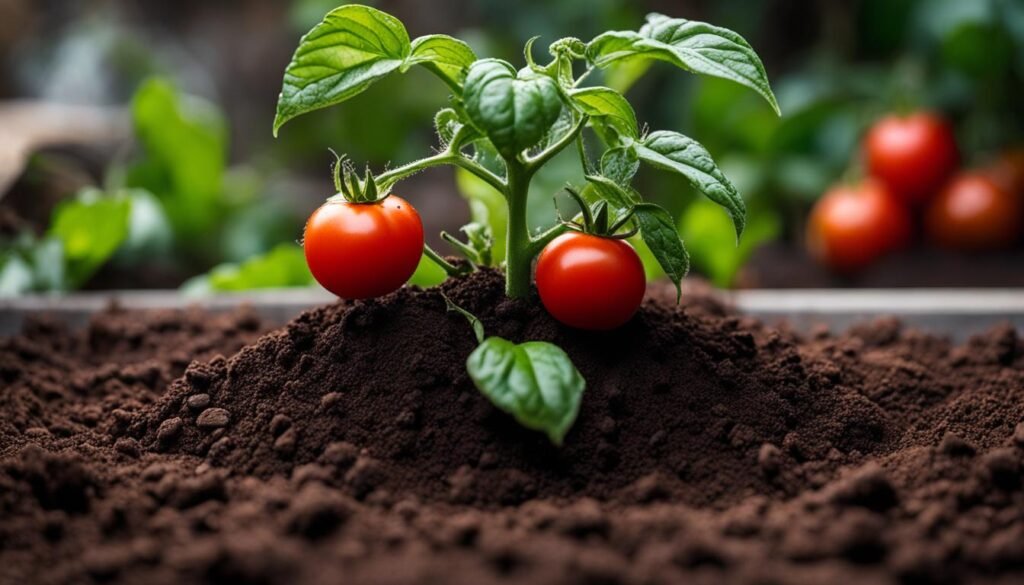
Coffee grounds are not just a great way to start your day, they can also contribute to improving the health of your soil. When used as a soil amendment, coffee grounds can help enhance the structure of the soil, creating a more favorable environment for plant growth.
Improving Soil Structure
The organic matter in coffee grounds can attract earthworms, which are beneficial to soil health. These earthworms consume the coffee grounds and help break them down, incorporating them deeper into the soil. This process improves soil structure by creating channels for air and water to penetrate, allowing better drainage and root development. Additionally, coffee grounds also introduce organic matter to the soil, which provides a food source for beneficial microorganisms that contribute to overall soil health.
By improving soil structure, coffee grounds create a more hospitable environment for tomato plants. Healthy soil with good structure allows for better nutrient absorption, root development, and water retention, all of which are crucial for the optimal growth of tomato plants.
Using Coffee Grounds Wisely
While coffee grounds can benefit soil health, it’s important to use them in moderation. Excessive use of coffee grounds can potentially make the soil too acidic or compact, negatively affecting plant growth. To avoid these issues, it’s recommended to mix the coffee grounds into the soil when planting tomatoes or use them as a thin layer of mulch. This way, the coffee grounds can slowly release their nutrients into the soil, providing long-term benefits without causing harm.
In conclusion, coffee grounds can be a valuable addition to your soil management practices. By improving soil structure and creating a more favorable environment for plant growth, coffee grounds can contribute to the overall health of your soil. Just remember to use them wisely and in moderation to ensure the best results for your tomato plants.
Coffee Ground “Tea” as Liquid Fertilizer
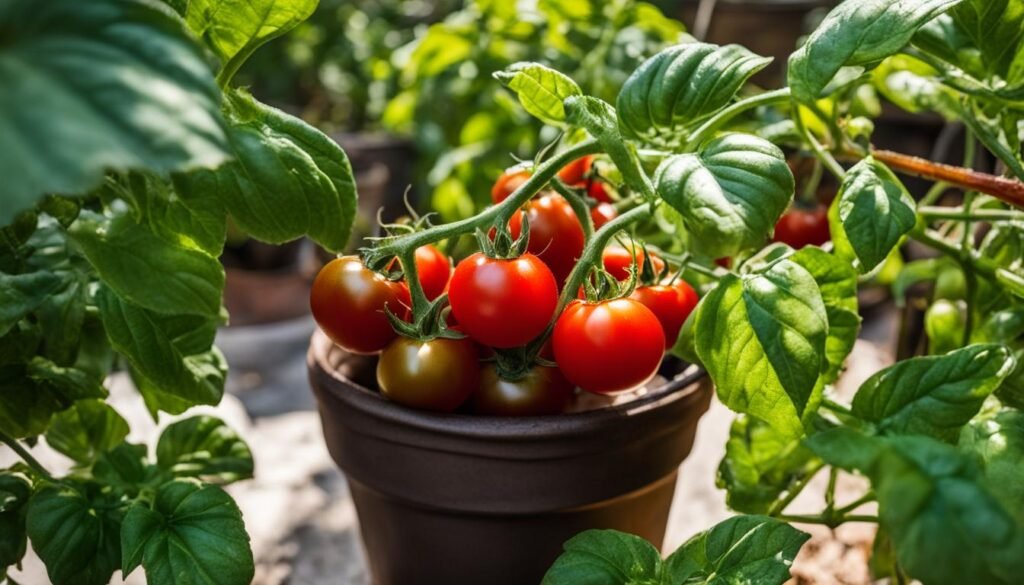
Another way to use coffee grounds for tomato plants is by making a liquid fertilizer, often referred to as coffee ground “tea.” This homemade fertilizer can provide your tomatoes with some additional nutrients to support their growth. To make coffee ground tea, simply add around two cups of used coffee grounds to five gallons of water. Let the mixture steep for a few days, stirring occasionally. Afterward, strain the liquid, dilute it with water if desired, and use it to water your tomato plants.
The coffee ground tea can be beneficial as it contains nitrogen, phosphorus, and potassium, which are essential nutrients for plant development. However, it is important to note that the nutrient levels in coffee ground tea may not be as concentrated as those in store-bought organic fertilizers specifically formulated for tomatoes. Therefore, while coffee ground tea can complement your overall fertilization routine, it should not be relied upon as the sole source of nutrients for your tomato plants.
Using Coffee Ground Tea Properly
When using coffee ground tea as a liquid fertilizer, it is important to use it in moderation. Consider applying the tea once every two weeks or as needed during the growing season. Avoid overwatering your tomato plants with coffee ground tea, as excessive moisture can lead to root rot or other fungal diseases. Instead, use the tea as a supplemental source of nutrients alongside regular watering and proper soil amendments.
Remember that while coffee ground tea can provide some benefits for your tomato plants, there are other organic fertilizers and soil amendments available that are specifically designed to meet the nutritional needs of tomatoes. It is always a good idea to explore different options and find the best combination of fertilizers and amendments that work for your garden. By taking a balanced approach and paying attention to the needs of your plants, you can help your tomatoes thrive and yield a bountiful harvest.
Moderation and Alternatives
When it comes to using coffee grounds for tomato plants, moderation is key. While coffee grounds can provide some benefits, it’s important to use them in moderation to avoid potential drawbacks. Excessive use of coffee grounds can lead to phytotoxicity, which can harm tomato plants rather than benefiting them. To ensure the best results, it’s recommended to incorporate coffee grounds into compost or use them as a soil amendment, rather than directly applying them in excess.
Furthermore, it’s worth considering alternatives to coffee grounds for tomato plants. While coffee grounds can contribute to soil fertility, there are other organic fertilizers and soil amendments that are specifically formulated for tomatoes. These alternatives may offer more significant benefits and ensure optimal plant growth. By exploring different options, you can find the best approach that suits your tomato plants’ needs.
In conclusion, while coffee grounds have their benefits for tomato plants, it’s essential to practice moderation in their usage. Their effects on tomato growth and production are not scientifically proven, and excessive use can lead to problems. By considering alternatives and using coffee grounds in combination with other organic fertilizers, you can create a healthy soil environment for your tomato plants to thrive.
Conclusion
After evaluating the benefits and limitations of using coffee grounds for tomato plants, we can conclude that coffee grounds can be used to some extent as a fertilizer and soil amendment. Although their effects on tomato growth are not scientifically proven, incorporating coffee grounds into the soil can contribute to creating the right pH environment for tomato plants.
Coffee grounds contain essential nutrients like nitrogen, phosphorus, and potassium, which are beneficial for tomato plants. However, it’s important to note that these nutrients may take time to be released and have a noticeable impact on plant growth. Therefore, patience is key when using coffee grounds as a soil amendment.
When using coffee grounds, it’s crucial to monitor the soil acidity and avoid excessive use. Tomato plants prefer slightly acidic soil, so incorporating coffee grounds can help create the optimal pH environment. However, it’s essential to strike a balance and consider other organic fertilizers and soil amendments to ensure optimal growth and avoid potential adverse effects.
In conclusion, while coffee grounds can contribute to improving soil health and providing essential nutrients for tomato plants, they should be used in moderation and as part of a comprehensive fertilization plan. By following these guidelines and considering other organic alternatives, you can create the ideal conditions for your tomato plants to thrive.
FAQ
Do coffee grounds benefit tomato plants?
Coffee grounds can slightly acidify the soil, which is beneficial for tomato plants that thrive in slightly acidic conditions. They also contain essential nutrients like nitrogen, phosphorus, and potassium. However, the effects of coffee grounds on tomato growth and production are not scientifically proven.
Can coffee grounds acidify the soil for tomato plants?
Yes, coffee grounds can help to acidify the soil when used as fertilizer. However, the acidity of coffee grounds can vary, so it is important to monitor and adjust the soil pH accordingly.
How do coffee grounds act as fertilizer for tomato plants?
Coffee grounds contain nitrogen, phosphorus, and potassium, which are essential nutrients for tomato plant growth. Incorporating coffee grounds into the soil provides these nutrients over time, but it may take a while for the coffee grounds to have a noticeable impact on plant growth.
Can coffee grounds be used as mulch for tomato plants?
Yes, coffee grounds can be used as mulch around tomato plants to retain moisture and suppress weed seed germination. However, it is important to use a thin layer of fresh coffee grounds to avoid compaction and potential suffocation of the plant roots.
How do coffee grounds improve soil health for tomato plants?
Coffee grounds increase microbial activity in the soil and attract earthworms, which help in incorporating the grounds deeper into the soil and improving its structure. This can benefit tomato plants by providing a more favorable environment for root growth and nutrient uptake.
How can coffee ground “tea” be used as a liquid fertilizer for tomato plants?
Coffee ground “tea” can be made by adding used coffee grounds to water. This liquid fertilizer can be used to water tomato plants and provide them with additional nutrients. However, the concentrated levels of nutrients in coffee ground tea may not be as significant as using store-bought organic fertilizers specifically formulated for tomatoes.
How much coffee grounds should be used for tomato plants?
It is recommended to mix about 1 cup of used coffee grounds into the top 2-3 inches of soil around tomato plants. When using coffee grounds as mulch, a thin layer of about 1/2 inch is sufficient.
Can using too much coffee grounds have adverse effects on tomato plants?
Yes, using too much coffee grounds can have adverse effects on tomato plants, such as phytotoxicity. It is important to use coffee grounds in moderation and consider other organic fertilizers and soil amendments for optimal plant growth.
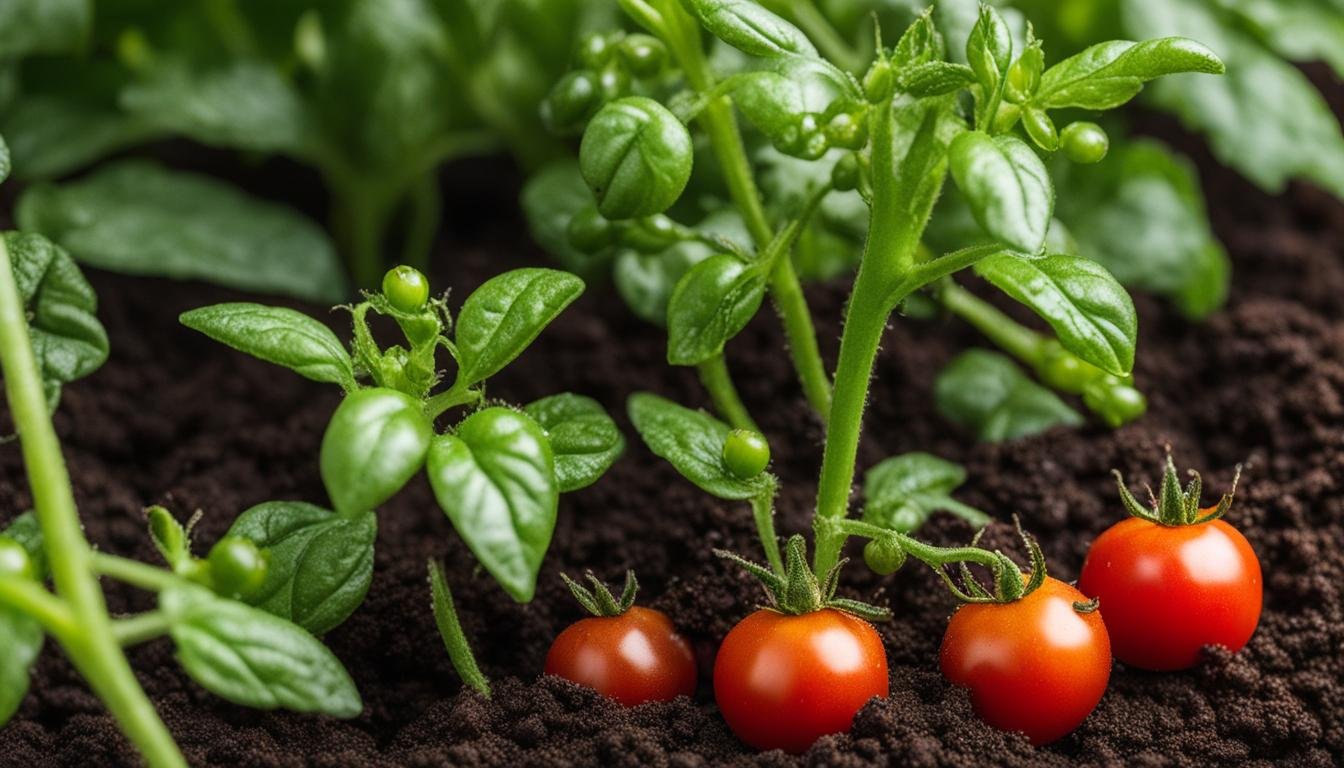
Leave a Reply